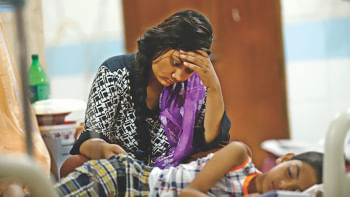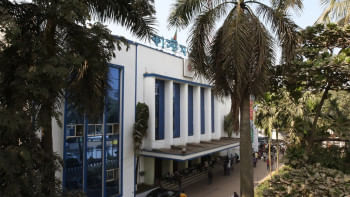Why is dengue still around?

In a worrying development in the dengue situation recently, the death toll from the disease across the country has set a new record, with at least 216 deaths recorded as of November 17. In 2019, the official death toll was 179, the highest in the history of dengue in Bangladesh. This year, since the disease started to spread around May, we have repeatedly asked the authorities to learn from past experience and take effective steps to prevent infections and deaths. But unfortunately, they paid little heed to such warnings. The result of that is now visible to everyone.
Although experts had earlier predicted that the infection rate would come down with the approach of winter, we are still getting news of new infections, hospitalisations and deaths almost every day. This makes us wonder whether our researchers and health authorities have conducted any substantial studies on the dengue situation, or considered the changing patterns of this disease. Also, with rapid, unplanned urbanisation making it conducive to the spread of the virus, have our authorities at all considered this factor while preparing to tackle the situation?
In the previous years, we saw how the disease started to spread around the start of the rainy season, and the severity of the spread would come down before winter. But this year, the situation seems to be quite different. Another significant change in the nature of the disease is that despite the infection rate being low this year – with 50,000 infections – compared to 2019, when more than 100,000 infections were reported, the number of deaths has been much higher this year. Reportedly, there are now four distinct serotypes of the dengue virus. Previously, there were three. These multiple serotypes have not only caused a rise in dengue cases this year, but also, crucially, turned the patients' conditions severe, resulting in heavy casualties.
The question is, why couldn't our health authorities predict the impending danger of dengue so that we could prepare accordingly? The lack of mosquito repellent drives in Dhaka and other cities also makes it clear that the authorities concerned have not taken the dengue menace seriously even after all the deaths. Moreover, it is very unfortunate that despite living with this disease for the last two decades, we still have not been able to formulate any integrated vector control policy to deal with it.
It is time the authorities took the evolving dengue threat with the seriousness it deserves. One life lost because of inaction is one too many. The authorities must shed their indifference and do whatever necessary to stop the spread of the virus and prevent suffering. The lack of preparation on the part of our healthcare facilities has also been widely reported in the media, which must change. We do not want to see any more deaths from dengue in the coming days.

 For all latest news, follow The Daily Star's Google News channel.
For all latest news, follow The Daily Star's Google News channel. 





Comments